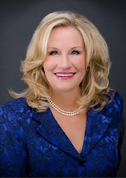© 2013 The Texas Lawbook.
By Patricia Baldwin
Lifestyle Writer for The Texas Lawbook
AUSTIN (June 25) – Sharon Schweitzer has traveled to 45 countries on seven continents – she’s recently returned from a People-to-People cultural itinerary to Cuba. The 1989 graduate of South Texas College of Law has trained executives throughout the world about cross-cultural differences in global business practices.
When it comes to legal clients, however, the biggest request for the services of her Austin-based Protocol & Etiquette Worldwide is surprising. Law firms want training in dining etiquette.

“What I hear consistently from law firm administrators – and they give this to me directly from the managing partners – is that they want the associates and younger lawyers to be more polished when dining with clients,” Schweitzer says.
After all, knowing the water glass is on the right and the bread plate is on the left are not facts covered in the typical college curriculum. More and more, law firms, corporations, “household-name” clients and career service offices at universities are hiring Schweitzer to conduct protocol and etiquette seminars for dealing in an increasingly sophisticated global economy.
Steven Edmond, dean of the School of Business and Technology at Huston-Tillotson University in Austin, says Schweitzer provides an “invaluable service” to the business students in the school’s annual dining etiquette workshops.
“Sharon teaches skills that provide our graduates with confidence during job interviews and business dinners,” Edmond adds.
Schweitzer confirms that confidence is as important an outcome of her seminars as knowledge of international social, communication and business customs.
“Eighty-five percent of job success is based on ‘soft skills,’ while only 15 percent is based on technical knowledge. Ninety percent of a first impression is based on nonverbal skills,” she quotes from a study by Harvard University, the Carnegie Foundation and Stanford Research Institute.
“That’s once you have the job,” she emphasizes. “That statistic always surprises people. The ‘soft skills’ are the people skills.”
Megan Pajakowski, client services manager at the Benesch, Friedlander, Coplan & Aronoff law firm in Cleveland, Ohio, uses Schweitzer’s services to “fine tune the business skills of our up-and-coming associates.”
The firm’s business development team also consults Schweitzer about overseas travel.
In particular, Jeanne Hammerstrom, chief marketing and recruiting officer at Benesch, says Schweitzer has been helpful when the firm hosts events in its Shanghai office – “so we’re not embarrassed by inappropriate professional etiquette in China.”
Hammerstrom adds, “Sharon has provided our attorneys with real life scenarios and information and skills they can use on a daily basis with client meetings, events and personal encounters.”
Schweitzer is used to questions about her work. “People don’t understand,” she says. “They hear ‘business etiquette’ and ask, ‘What is that about?’”
The firm’s brochure offers lists of various etiquette and protocol workshops to answer that question. Topics are wide-ranging, including business card protocol, professional handshakes (there are at least 10), gift-giving protocol, eye signals, forms of address, gestures to avoid, global negotiating and more.
Yet Schweitzer’s simplest explanation is about relationships.
“Relationships weave the fabric of our lives,” she says. “Client relationships. Personal relationships. Business relationships. You can be the best litigator in the world. You can argue. You can take a great deposition. But you need to know when to draw that line and when to treat people differently.”
For example, the City of Austin approached Schweitzer to help with its Business Preparedness Workshops at City Hall prior to the Formula 1 Grand Prix race, which was held at the Circuit of the Americas racetrack last November.

“The city wanted to assist businesses in understanding cultural differences,” Schweitzer says. Her guidance was especially critical to the hospitality industries. After all, the weekend event attracted 265,499 fans. Austin-area hotels gained nearly $22 million more in room revenue during the first F1 week than they did during the same week in 2011.
“We’re used to having restaurants turn tables quickly,” Schweitzer says. “In the U.S., we eat. Europeans dine.”
She also notes that European restaurateurs routinely use mobile credit card scanners. “They hand the card right back,” she explains. The fact that the typical U.S. waiter is likely to take a customer’s credit card away from the table can be upsetting for a European.
Another cultural difference: “Personal space” is a U.S. concept. Brazilians, however, “love to touch,” Schweitzer says. “They are very kinesthetic. If you don’t engage, you are cold. You are detached.”
Schweitzer says she has long enjoyed international travel and is fascinated by cultural differences. As a child, she heard stories of talented relatives in the Czech Republic. When she and her parents finally visited in 2002, she was impressed with the Eastern Europeans’ knowledge of the world.
“Sometimes, I think Americans can be very ethnocentric,” she comments. “We think that the world revolves around the United States.”
The family trip to the Czech Republic started her thinking about a new business; another trip prompted her to act. The latter was a trip to the Austin Heart Hospital, where a physician diagnosed a “heart warning” and told the practicing attorney that she needed to slow down – “right away.”
After a sabbatical from legal practice, Schweitzer attended training at the Protocol School of Washington in 2005 and incorporated her company in 2006. Last fall, she moved the business to a downtown Austin executive suite from the home she shares with her husband, John Robinson, CEO of Capitol Services Inc., and Charm, a golden retriever.
Much of her work is kept confidential – well-known clients demand nondisclosure agreements.
But Schweitzer is often called upon as an expert resource for media stories and is generous with general protocol and etiquette tips. The difference between success and failure, she notes, involves “the little things.”
Such as:
* Putting a business card away without reading it is an unforgivable insult to the Chinese business culture.

* Also in China, business revolves around guanxi (pronounced gwan-SHEE) or networks of influence. Businesswomen will find such local counterparts helpful in avoiding awkward moments when asked, “Where is your husband?”
* In some areas of Europe and in certain countries, including Australia and Japan, the gratuity is built into the cost of the meal, and additional tips are not expected.
* The U.S. sign for “OK” is considered extremely vulgar in Brazil.
* Keep hand gestures to a minimum when meeting with associates from non-demonstrative countries like Canada, England, the Netherlands and Denmark. To call attention to a specific business location, avoid pointing and say, “look at 11 o’clock.”
* Accept the offer of coffee, tea, water or refreshments in Asia and the Middle East. To decline this offer is a sign of disrespect to your host.
* Women are discouraged from wearing pants in Japan and the Middle East.
And when it comes to cross-cultural differences, Schweitzer advises, don’t forget regional business nuances. New Yorkers can easily be left baffled in Texas.
Do you have a special avocation, hobby or other lifestyle interest to share? Please email patricia.baldwin@texaslawbook.net
© 2013 The Texas Lawbook. Content of The Texas Lawbook is controlled and protected by specific licensing agreements with our subscribers and under federal copyright laws. Any distribution of this content without the consent of The Texas Lawbook is prohibited.
If you see any inaccuracy in any article in The Texas Lawbook, please contact us. Our goal is content that is 100% true and accurate. Thank you.
